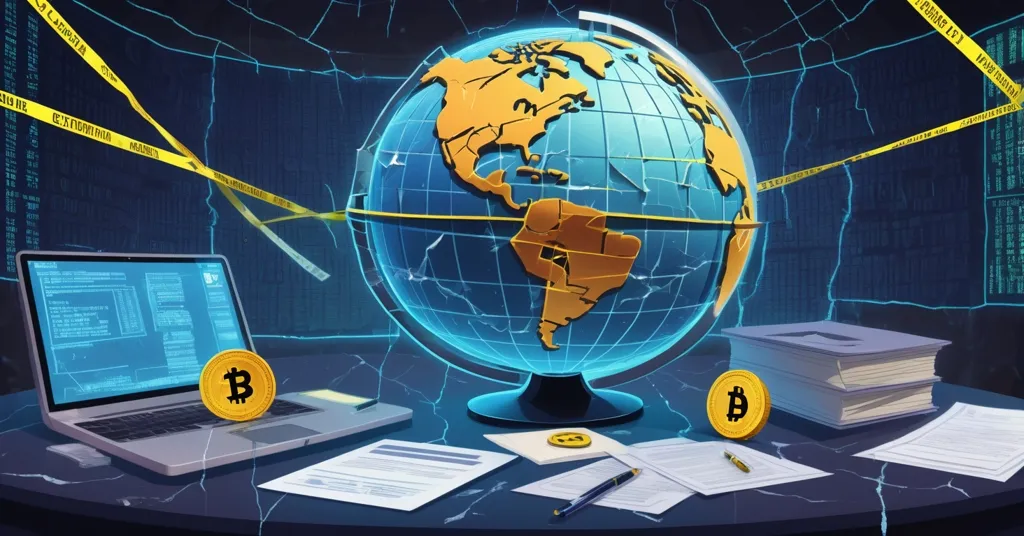Worldcoin Hit with Regulatory Bans in Kenya and Indonesia Over Privacy Concerns

Worldcoin Faces Regulatory Hurdles as Kenya and Indonesia Take Action
Worldcoin, a cryptocurrency project aiming to create a digital identity system, faces significant regulatory challenges in Kenya and Indonesia due to data privacy concerns.
- Kenyan court rules Worldcoin’s data collection illegal
- Indonesia suspends Worldcoin operations
- Worldcoin token value drops over 5%
In a bold move on May 5, 2025, the Kenyan High Court declared Worldcoin’s activities in the country illegal under the Data Protection Act of 2019. The court, presided over by Justice Aburili Roselyne, found that Worldcoin’s method of harvesting iris and facial biometric information violated data protection laws. Biometric data refers to unique physical characteristics like your fingerprints or eye patterns used to identify you. The ruling came after a court case lodged by the Nairobi-based Katiba Institute, which argued that the consent obtained by Worldcoin was invalid due to the use of monetary incentives in the form of cryptocurrency. The court ordered Worldcoin to erase all biometric data collected in Kenya within seven days, highlighting the severity of the legal breach.
The Kenyan Data Protection Act of 2019 requires explicit consent for collecting personal data, and the court found that Worldcoin’s use of cryptocurrency as an incentive invalidated this consent. Justice Roselyne stated,
“The consent was not legal since it was elicited through monetary incentives with Worldcoin’s cryptocurrency.”
This ruling reflects broader concerns about the ethical implications of using financial incentives to collect sensitive personal data.
Simultaneously, Indonesia’s Ministry of Communications and Digital (Komdigi) took action against Worldcoin, suspending its operations in the country. The ministry cited operating without proper legal permissions and failing to register with authorities as the reasons for the suspension. PT Terang Bulan Abadi and PT Sandina Abadi Nusantara, entities associated with Worldcoin, were implicated in the unauthorized operations. Alexander Sabar, director general for digital oversight, emphasized the seriousness of the offense, stating,
“Noncompliance with registration requirements and identity theft of another legal entity is a grave offense.”
The regulatory actions in both countries have had a direct impact on Worldcoin’s token value. In the past 24 hours, the WLD token experienced a decline of over 5%, dropping to $0.88. This drop reflects investor concerns amidst the legal and privacy issues surrounding the project. Worldcoin’s approach of using “Orbs” to scan individuals’ irises in exchange for cryptocurrency has raised significant public outcry over security and privacy concerns, leading to earlier suspensions of registration in Kenya.
Despite these challenges, Worldcoin has been proactive in its response. In Indonesia, the project voluntarily paused its proof-of-human verification services to seek clarification on licensing and permits, showing a commitment to compliance. In Kenya, Worldcoin has engaged with local stakeholders and authorities, emphasizing its dedication to transparency and adherence to data protection laws. The project’s risk disclosure document acknowledges the experimental nature of its technology and warns users about the potential for significant losses and the speculative nature of the WLD token.
The regulatory scrutiny faced by Worldcoin is part of a global trend where governments are increasingly vigilant about the implications of cryptocurrencies and digital identity initiatives. The actions in Kenya and Indonesia highlight the need for projects like Worldcoin to navigate complex regulatory landscapes carefully. Public interest in Kenya remains high, suggesting potential for adoption if Worldcoin can address privacy and compliance issues effectively.
However, the project’s journey is fraught with technological risks and challenges. The risk disclosure highlights potential coding errors, security vulnerabilities, and the experimental nature of the technology, which could impact its functionality and global acceptance. Despite these hurdles, Worldcoin’s engagement in public education and outreach in Indonesia indicates an effort to build trust and comply with local regulations.
Worldcoin’s vision of a decentralized digital identity system is ambitious and innovative, but it’s clear they’re navigating a minefield. The project’s reliance on biometric data, while revolutionary, clashes with the growing global emphasis on data privacy. It’s a classic case of the future colliding with the present.
While some in the crypto community herald Worldcoin as the next big thing in digital identity, others see it as a dystopian nightmare. The promise of earning crypto through an iris scan sounds too good to be true, and for many, it is. Yet, the project’s global footprint, with 858 Orb locations worldwide, indicates significant interest and potential for growth.
But let’s not forget the elephant in the room: privacy. In an era where data breaches and identity theft are rampant, the idea of trading personal biometric data for cryptocurrency raises red flags. It’s a delicate balance between innovation and privacy, and Worldcoin’s journey so far has been more like a rollercoaster than a smooth ride to the future.
So, what does this mean for the broader crypto landscape? Worldcoin’s struggles serve as a cautionary tale for other projects venturing into the realm of biometric data and digital identity. It underscores the importance of compliance and public trust in the pursuit of technological advancement. But it also highlights the potential for revolutionary change if these issues can be addressed effectively.
For those of us who champion decentralization and the disruption of the status quo, Worldcoin’s challenges are a reminder that the road to a decentralized future is not without its bumps. Yet, the potential for such a system to empower individuals with true digital sovereignty is too compelling to ignore. As we watch Worldcoin navigate these regulatory hurdles, we must ask ourselves: Is the promise of a decentralized digital identity worth the privacy risks?
Key Questions and Takeaways:
- What legal issues did Worldcoin face in Kenya?
Worldcoin faced legal issues in Kenya for violating the Data Protection Act of 2019 by harvesting iris and facial biometric information without legal consent.
- Why did Indonesia suspend Worldcoin’s operations?
Indonesia suspended Worldcoin’s operations due to operating without proper legal permissions and failing to register with authorities.
- How did the regulatory actions affect Worldcoin’s token value?
The regulatory actions led to a decline in Worldcoin’s token value by over 5%, reflecting investor concerns.
- What are the public concerns surrounding Worldcoin’s data collection practices?
Public concerns include security and privacy issues, particularly related to the collection and potential misuse of biometric data.
- What is the significance of the Kenyan court’s data deletion order?
The Kenyan court’s order to delete all collected biometric data within seven days highlights the severity of Worldcoin’s violation of data protection laws and the importance of legal consent in data collection practices.
As Worldcoin continues to navigate these regulatory challenges, it serves as a potent reminder of the delicate balance between innovation and privacy. While the vision of a decentralized digital identity system is compelling, the road to achieving it is fraught with legal and ethical considerations. For those in the crypto space, Worldcoin’s experience is a lesson in the importance of compliance and public trust in the pursuit of technological advancement. While some see Worldcoin as a privacy nightmare, others believe it’s the future of digital identity. Which side are you on?



